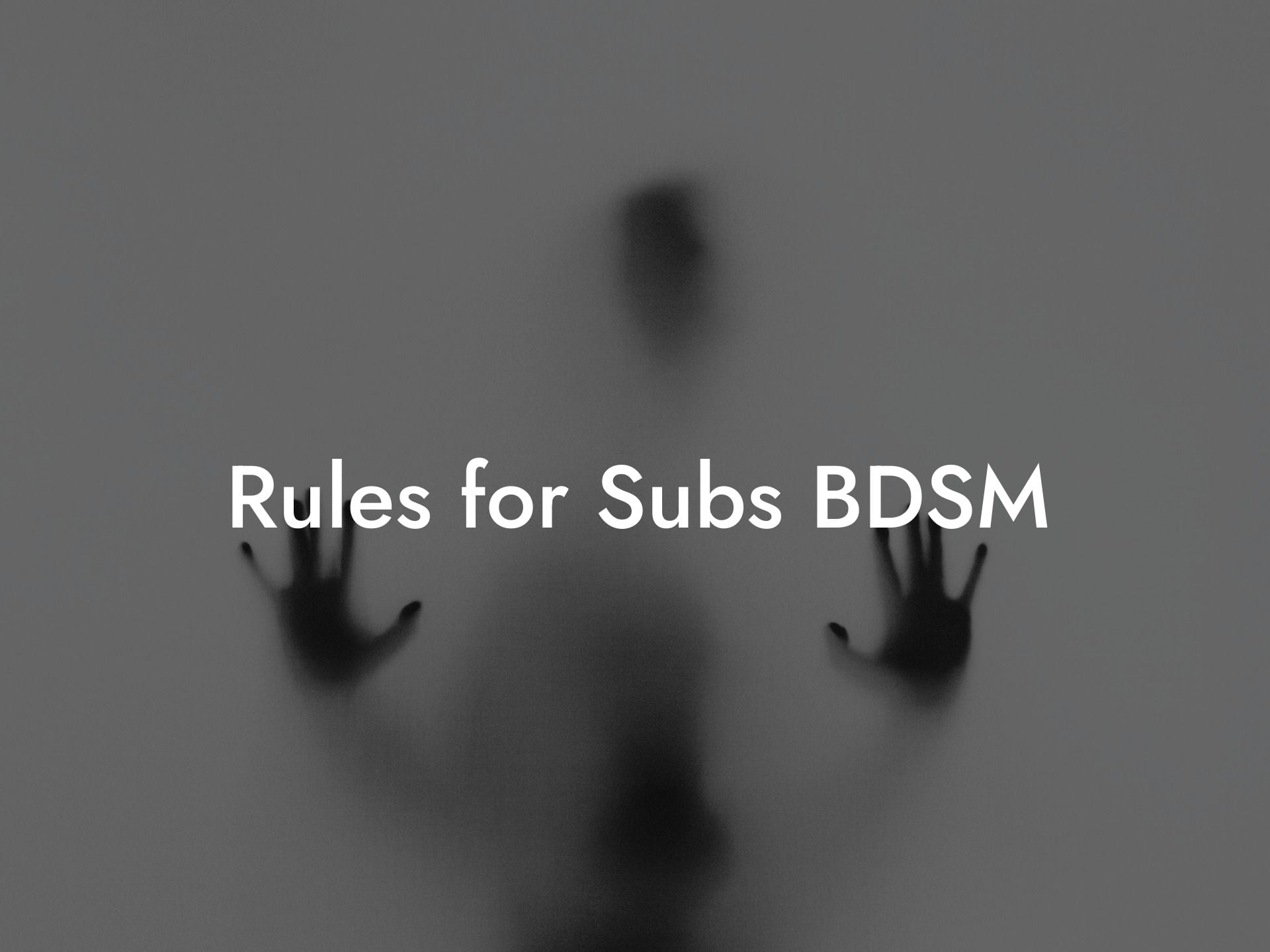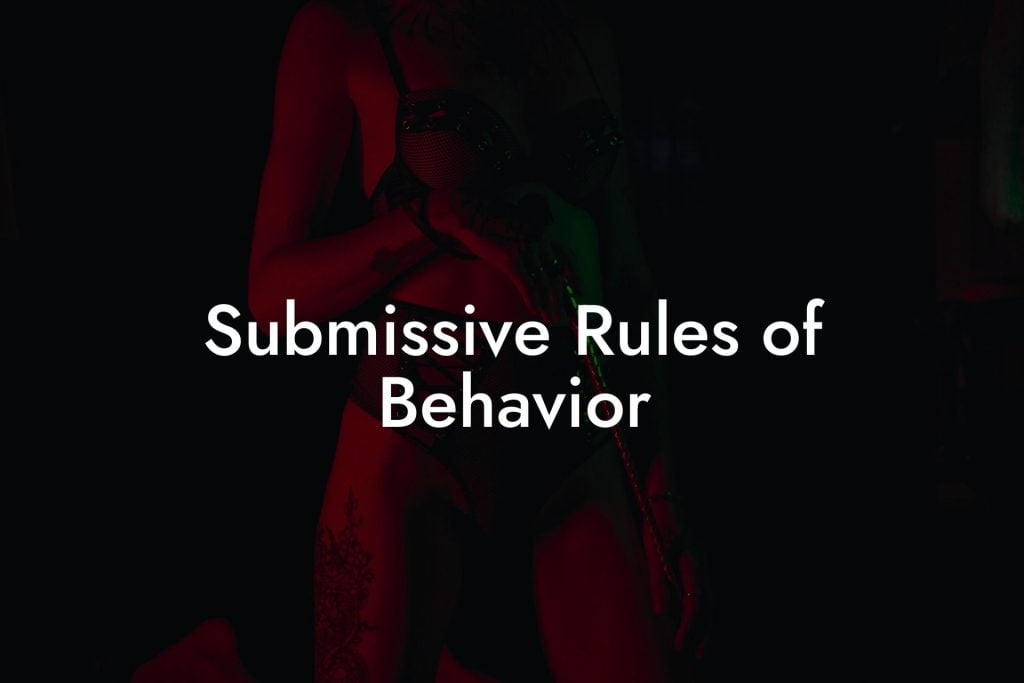Entering the captivating world of BDSM as a submissive can be an exhilarating yet complex journey. With its unique dynamics, boundaries, and rituals, understanding the rules is crucial for a fulfilling experience. In this article, we will explore the essential rules for subs, providing you with insights and knowledge to make the most out of your submissive role. Whether you are a beginner exploring your curiosity or an experienced practitioner seeking to deepen your understanding, let us be your guide into this enchanting realm.
In any BDSM relationship, consent is the cornerstone of trust and respect. It’s more than just saying “yes” or “no”—it’s about openly communicating your desires, limits, and expectations. But trust doesn’t end with a conversation—it’s built through ongoing, clear agreements. That’s where our Dominant & Submissive BDSM Contract Pack comes in. Find out more →
Establishing Consent
- Understanding the importance of consent as the foundation of BDSM.
- Discussing safe words, negotiation, and continuous communication.
- Explaining the concept of consensual non-consent and the necessity of consent even within power dynamics.
Boundaries and Limits
- Emphasizing the significance of setting and respecting personal boundaries.
Looking for the best BDSM & Kink OnlyFans content creators? Here is a list of 10 of our favourites:
- Best Cosplay OnlyFans - 🐱 Little Kitty Kate 👉👌 >> Link
- Best Little OnlyFans - 🧸 Katya 🙇♀️ Sun >> Link
- Best Sub OnlyFans - 🍌Hanna Banana🍌 >> Link
- Best Teen & Huge Tits OnlyFans - ❣️Anny❣️19 y.o. BUSTY student girl >> Link
- Best Tiny Tits OnlyFans - ⍣⭐️ Sofia Parker ⭐️⍣ >> Link
- Best Sub & Huge Boobs OnlyFans - Nika Huge Boobs >> Link
- Best Kink OnlyFans - Julia Pearl🐚 >> Link
- Best Fetish & Girl Next Door OnlyFans - Hillary is Wet 💦 >> Link
- Best Dirty Latina OnlyFans - Paula Flores 😈 >> Link
- Best BBW & Huge Ass OnlyFans - Naughty Hanna Zimmer 💜🎀 >> Link
Not quite what you are looking for? View the full list →
- Identifying hard limits, soft limits, and exploring the concept of pushing boundaries in a consensual manner.
- Discussing the importance of aftercare as a means to support emotional well-being after intense sessions.
Effective Communication
- Highlighting the role of clear and honest communication for successful BDSM experiences.
- Discussing active listening, expressing desires, and utilizing tools like BDSM contracts.
- Emphasizing the importance of ongoing communication to maintain consent and gauge satisfaction.
Rituals and Protocols
- Exploring the realm of rituals and protocols to enhance power dynamics.
- Discussing the significance of protocols in reinforcing roles and maintaining discipline.
- Providing examples of common protocols such as rules for dress code or behavior during specific scenarios.
Frequently Asked Questions
What is a BDSM contract?
A BDSM contract is a document that outlines the expectations, limits, and roles of the participants engaged in a BDSM relationship. It aims to provide a clear framework for consensual and informed BDSM activities, ensuring that all parties have a mutual understanding of their commitments and boundaries. These contracts are not legally binding but serve as a powerful tool for communication and negotiation.
Why are BDSM contracts important?
BDSM contracts are important because they prioritize consent, trust, and safety. By clearly defining the terms and conditions of the BDSM relationship, they help prevent misunderstandings and ensure that all parties feel respected and protected. They also provide an opportunity for participants to discuss and align their desires and limits before engaging in any activity.
What should be included in a BDSM contract?
A BDSM contract should include the names or pseudonyms of the participants, their roles (e.g., dominant, submissive), duration of the contract, expectations, limits, safewords, and any preexisting health conditions that might affect play. It should also cover safety measures, aftercare arrangements, privacy concerns, and how to handle contract modifications or termination.
Is a BDSM contract legally enforceable?
No, BDSM contracts are not typically legally enforceable. They are intended as a private agreement between consensual adults to define the scope of their BDSM relationship. However, they can illustrate the consent given and help avoid disputes, as they demonstrate clear communication about the intentions and boundaries agreed upon by all parties involved.
How do power dynamics work in a BDSM relationship?
Power dynamics in BDSM involve the consensual exchange of control between partners. One partner assumes a dominant role and takes control, while the other assumes a submissive role and surrenders control. These roles are established through negotiation and can be fluid, with respect given to each partner's limits and boundaries.
How can I ensure consent in a BDSM relationship?
Consent in BDSM is paramount and must be expressed clearly and unequivocally. It requires open communication and ongoing check-ins to ensure all parties are comfortable and agree to the activities. Consent must be informed, voluntary, and revocable at any time, with safewords in place to immediately pause or stop the activity.
What are safewords and how do they work?
Safewords are pre-agreed upon words or signals used in BDSM to communicate when a participant needs to pause or stop the activity immediately. They are vital for maintaining safety and must be respected without question. Common safewords may include "red" for stop and "yellow" for caution or to slow down.
What is the significance of trust in a BDSM context?
Trust is the cornerstone of BDSM relationships. It allows partners to feel safe exploring their desires and pushing their boundaries. Trust is built over time through consistent, respectful behavior, adherence to agreed terms, and transparent communication. Without trust, the BDSM experience can be unsafe and unfulfilling.
How should I approach aftercare?
Aftercare is the practice of attending to the physical and emotional needs of all participants following a BDSM scene. It may involve cuddling, discussing feelings and experiences related to the scene, hydration, or tending to any physical marks or discomfort. Aftercare is crucial for reconnecting and ensuring the well-being of everyone involved.
Can you revoke consent during a BDSM scene?
Yes, consent can and should be revoked if a participant feels uncomfortable, unsafe, or simply changes their mind during a BDSM scene. This is why safewords and other signals are essential—so that all parties can communicate the immediate need to adjust or halt the activity.
How do I discuss limits with my partner?
Discussing limits with your partner involves open and honest communication. Begin the conversation outside of a sexual context, clearly express your hard limits (non-negotiables) and soft limits (which may be open to discussion), and encourage your partner to do the same. It's important that this communication is judgment-free and compassionate.
Are BDSM activities always sexual?
No, BDSM activities are not always sexual. While they often include sexual elements, the emphasis can be on power exchange, pain play, or achieving heightened states of emotion or sensation. Some people engage in BDSM for the dynamic and psychological aspects without sexual intercourse.
What if my interests in BDSM are different from my partners?
It's common for partners to have different interests within BDSM. Effective negotiation is key to finding common ground or reaching a compromise. Consider each other's interests and limits, and explore activities that cater to both parties while steering clear of hard limits. Flexibility and creativity can lead to fulfilling experiences for everyone involved.
How do you maintain safety in a BDSM scene?
Maintaining safety in BDSM requires thorough preparation, clear communication, education about safe practices, and the proper use of safewords. Safety measures include agreeing on limits, knowing the physical and emotional state of participants, and having a first aid kit and other safety equipment on hand. Regular check-ins during play ensure that consent remains ongoing and that everyone feels secure.
How often should we renegotiate our BDSM arrangement?
BDSM arrangements should be renegotiated whenever there is a change in boundaries, interests, or relationship dynamics. Regular check-ins can also be an opportunity to discuss whether the existing arrangement is still optimal. Openly communicate about your evolving needs and desires to ensure the arrangement stays consensual and fulfilling.
What if someone breaks a rule from our BDSM contract?
If someone breaks a rule from a BDSM contract, it is crucial to address the situation promptly and openly. Discuss why the breach occurred, how it affected the people involved, and steps to prevent future violations. Depending on the severity and willingness to resolve the issue, it may require alterations to the contract or reconsideration of the relationship.
Can beginners engage in BDSM safely?
Beginners can engage in BDSM safely by starting with thorough research, clear communication, and consent. It's advisable to begin with less intense activities and gradually explore further as experience and trust grow. Beginners should also consider attending workshops, seeking mentors, or learning from experienced community members while prioritizing safety and consent.
What role does privacy play in BDSM?
Privacy in BDSM helps protect the identities and personal lives of those involved. Given the sensitive nature of BDSM and potential societal misconceptions, participants often choose to keep their activities and involvement confidential. Establishing what information can be shared outside of the relationship and how it may be disclosed is essential for maintaining privacy and trust.
How can we make sure that our contract covers all necessary aspects?
To ensure that your BDSM contract covers all necessary aspects, consider including an extensive list of activities, detailed limits, safewords, and provisions for aftercare. Seek guidance from more experienced members of the BDSM community, utilize templates, and consult resources that focus on safety and consent. The contract should be a living document, open to revisions as your understanding and experiences evolve.
Is it okay to change my mind after agreeing to a BDSM contract?
Yes, it is perfectly okay to change your mind after agreeing to a BDSM contract. What matters most is your comfort and consent. BDSM is a dynamic practice, and your feelings or boundaries may change over time. It's important to communicate these changes to your partner(s) and update the contract as necessary to reflect your current consents and limits.
How does one handle accidental injuries during a BDSM scene?
Accidental injuries during a BDSM scene should be addressed immediately and with care. Stop the activity, assess the injury, and provide appropriate first aid or seek medical attention if necessary. After addressing the physical aspects, discuss the emotional impact and consider how the injury occurred to prevent similar issues in future scenes. A commitment to safety and ongoing education is critical in minimizing risks.
Continue to unlock the potential of your submissive journey by exploring more guides, products, and resources in the Filthy Adult world. Our Ultimate BDSM Contract Pack offers a comprehensive collection of contracts tailored to various BDSM dynamics. Don't miss out on the opportunity to delve deeper into this fascinating lifestyle. Remember to share this article with others who may benefit from it and embrace the pleasure of discovery within our fetish shop.













